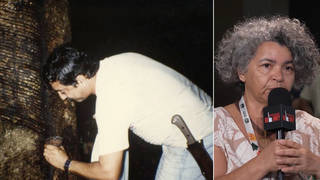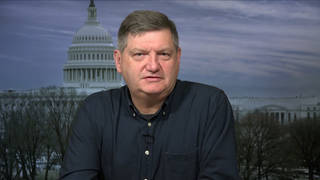
Whoever in the White House burned Wilson’s wife could be charged under the Intelligence Identities Protection Act which imposes strict penalties on the outting of agents. We speak with former CIA agent Phillip Agee, for whom, many believe, the Act was written. [Includes transcript]
Click here to read to full transcript Former acting ambassador to Iraq Joseph Wilson says that the outing of his wife other attempts to discredit him “are clearly intended to intimidate others from coming forward.” But it’s not just intimidation; it’s a felony. Until now, a crime the Bush family has taken very seriously.
Many believe the law was passed in direct response to former CIA agent Philip Agee’s blowing the whistle on CIA dirty tricks in his book Inside the Company: CIA Diary George H.W. Bush, who was vice-president when the law was passed, said some of the criticism of the Agency ruined secret U.S. clandestine operations in foreign countries.
So seriously did the Bushes take the crime of exposing CIA operatives that Barbara Bush, in her memoirs, accused Agee of blowing the cover of the CIA Station Chief in Greece, Richard Welch, who was assassinated outside his Athens residence in 1975. Agee sued the former first lady and Mrs. Bush withdrew the statement from additional printings of her book. Still, at a celebration marking the fiftieth anniversary of the CIA, the elder Bush again singled out Agee in his remarks, calling him “a traitor to our country.”
- Phillip Agee, former CIA agent. In 1975 Agee wrote Inside the Company: CIA Diary about his experiences with the agency from 1957 to 1968. Many believe the Intelligence Identities Protection Act was passed in direct response to Agee’s blowing the whistle on CIA dirty tricks. He speaks to us from Cuba.
TRANSCRIPT
AMY GOODMAN: Well, Phillip Agee joins us now from Cuba. Welcome to Democracy Now!
PHILLIP AGEE: Good morning Amy.
AMY GOODMAN: Good to have you with us. Why don’t we start off with Larry Johnson’s comment with what the Bush’s alleged, and your response to this whole scandal that is brewing in Washington.
PHILLIP AGEE: Well, Mr. Johnson is repeating a story put about by the C.I.A. beginning with the Welch assassination in Athens in 1975.
From the moment of that event the C.I.A. tried to put the blame on me because at that time I was involved with quite a lot of other people in a guerrilla journalism campaign to expose the C.I.A.’s operations and its people, especially in western Europe at that time.
George Bush’s father came in as C.I.A. director the month following the Welch assassination. As director he presided over the agency as they mounted a campaign throughout western Europe trying to make me appear to be a security threat, a traitor, a Soviet agent, a Cuban agent. All those sorts of things which led to my expulsion from five different NATO countries in the late 1970’s.
In fact it was in all based on lies, and to think that I was responsible for the death of any C.I.A. people for their exposures is absolutely false. No one as far as I know of all those people who were exposed as C.I.A. people along with their operations was ever even harassed or threatened. What happened was, their operations were disrupted and that was the purpose of what we were doing.
We were right to do it then, because the U.S. policy at the time executed by the C.I.A. was to support murderous dictatorships around the world, in Greece, Chile, Uruguay, Brazil. That’s only to name a few, and we oppose that use of the U.S. intelligence service for those dirty operations.
I’m talking about regimes now that tortured and disappeared people by the thousands.
AMY GOODMAN: Can you talk about the process you went through, Phillip Agee, in the C.I.A., when you decided to expose what was going on?
PHILLIP AGEE: To begin with I was a typical young man of the 1950’s. I was always taught to accept the government as honest and as virtuous. I went into the C.I.A. because I wanted to serve my country.
When I went down to Latin America in 1960 I had had no political education in the sense that people were politically educated in the 1960’s, a generation later or practically a generation later. I got my political education when I was in Latin America seeing the realities around me day after day.
It happened at that time that U.S. policy was to isolate the Cuban Revolution in Latin America, and we were pretty successful in doing it in the early 1960’s.
At the same time we were doing it through our support to the traditional political forces in those countries, what are known as the Oligarchies. These are the people who have possessed the wealth and income and the land and so forth through many generations going back to colonial times.
Little by little I turned against the people that we were supporting because of their greed and because of the political repression that was required to keep this system of injustice glued together.
Eventually, I simply decided to leave the C.I.A. in 1968, and at the end of that year I left with no intention of writing a book or doing — taking any action.
I was going to start a new life, and, among other things, I reenrolled in university studies in a doctoral program at the University of Mexico in Latin American studies.
It was then that I began to think what until then had been unthinkable. A book on what I and my colleagues have been doing in the C.I.A. and Latin America. I had to choose between the university work and the book and I chose the book not knowing if I would ever get it done. But five years from the time I decided to do it I had it finished.
It was published eventually in 30 languages, it was a best seller in many different countries. I went on to write many articles, five more books, and for 30 years now I’ve been working in various activities in solidarity with the Cuban Revolution.
AMY GOODMAN: Phillip Agee, were there people inside the agency who quietly supported what you were doing?
PHILLIP AGEE: I have a feeling that there were, because you’ve just heard Larry Johnson speaking out against the misuse of the national intelligence service, the C.I.A., for, in this case, supporting a pack of lies concocted to justify converting 'a war of choice' into 'a war of necessity'.
This is of course wrong, and it is an abuse of the national intelligence service to do that. In my days there were certainly people who were opposed to the C.I.A.’s support, that is to the use of the policy — by the policy makers of the C.I.A. as an instrument to impose a criminal policy leading to the crimes against humanity.
I’m sure there were people in there, they didn’t get in touch with me. Years later I have had contact with former C.I.A. people who told me that inside the agency there were people who were very quietly approving what I was doing.
AMY GOODMAN: We’re talking to Phillip Agee, he’s in Cuba.
What are you doing in Cuba?
PHILLIP AGEE: I have started a business here and online travel services at www.cubalinda.com.
We have a website which presents a very wide range of practically everything a person can do in Cuba. It’s a continuation of solidarity that I was doing all through the 1970’s and 1980’s and 1990’s in the sense that it’s trying to put the truth about Cuba out there; encouraging people to come to this country to see the Cuban Revolution for themselves, because over these 44 years, there have been so many lies and distortions, put about in the public information media. I’ve always felt that it was important that people know the truth about this country.
AMY GOODMAN: Phillip Agee, I would like to actually have you on another time to have an extended discussion about Cuba. But sticking with the schedule here, I want to ask you finally, what you think about what’s happening with Joseph Wilson and the outing of his wife, Valerie Plame as an undercover C.I.A. operative.
PHILLIP AGEE: Well, first you have to realize that this law, the Intelligence Identities Protection Act, under which someone in the White House may be indicted, is his father’s law.
This is the — this is a law sought by George Bush senior, when he was C.I.A. director and later as Vice President, he worked hard to get that law passed.
It is the irony of ironies that the law is violated, I believe for the first time in a serious way, by someone working in the office of his own son. This is simply dirty politics, I believe. The ambassador, that is ambassador Wilson, poked a hole in this whole pack of lies that have been concocted to justify the war; and in retaliation, they try to ruin his wife’s career and get even with him, you could say that it’s dirty politics as usual. But also one has to wonder what Poppa Bush is thinking about the fact that it’s his own son’s office that has violated the law that he works so hard to get passed.
AMY GOODMAN: What do you think of people saying, it’s similar to what you did?
PHILLIP AGEE: …but for different reasons. My reason were very clear and we stated many times. As I mentioned earlier I was not alone in that campaign. I was working with a lot of people from a lot of different countries, and it was a spontaneous campaign because people were opposed to the horrible political repression that the United States through the C.I.A. was supporting in the 1970’s.
This current case is totally different, it’s simply a dirty low shot to — out of revenge essentially I believe.
AMY GOODMAN: Did you have any dealings with, for example, some of the players we’re talking about today: Dick Cheney, Donald Rumsfeld, Paul Wolfowitz, George Bush?
PHILLIP AGEE: I have not had dealings with them, but I followed the political positions of these people since the early 1990’s when Wolfowitz first came out with this policy document on a new United States foreign policy based on what would best be called I think neo-imperialism — and then later in the Project for a New American Century.
The major players in this Bush administration were all signers of that policy statement back in the 1990’s. It called for preemptive wars; it called for the control of the United States of the world essentially; and in this case it’s a question of control of Middle East oil among several other reasons. These lies that were used to justify it have all now been exposed. The world knows that they were all false, justifications that is. So the United States has been left alone: Germany is not going to participate; France is not going to participate; Russia is not participating. The United States has been left totally isolated in its intervention in Iraq. Deservedly so.
AMY GOODMAN: Do you condemn the blowing of Valerie plain’s cover?
PHILLIP AGEE: I don’t have any feelings whether it’s the right thing to do or the wrong thing to do. What is wrong is that it’s simply dirty politics.Whether it was the blowing of her cover or some other action.
It’s small potatoes compared to the whole scenario of lies that was used to justify the invasion of Iraq and the continuing occupation of that country.
AMY GOODMAN: Well, I want to thank you for being with us, former C.I.A. operative Phillip Agee who wrote the book “Inside the Company: C.I.A. diary”. We’re speaking to him in Cuba.
Thanks for being with us. You are listening to Democracy Now!











Media Options